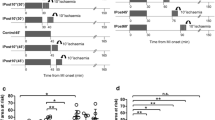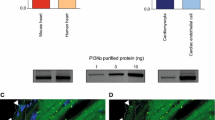Abstract
To further evaluate the significance of p38 MAPK as trigger or mediator in ischaemic preconditioning, anisomycin and SB 203580 were used to manipulate its activation status. Special attention was given to the concentration of the drugs and protocols used.
The isolated perfused rat heart, subjected to either 25 min global ischaemia or 35 min regional ischaemia, was used as experimental model. This was preceded by anisomycin (2 or 5 μM: 3 × 5 min; 5 μM: 5 min or 10 min; 5 μM: 10 min + 10 min washout or 20 μM: 20 min) or SB 203580 (2 μM: 3 × 5 min; before and during 3 × 5 min or 1 × 5 min ischaemic preconditioning; 10 min). Endpoints were functional recovery during reperfusion and infarct size.
Anisomycin, regardless of the protocol, reduced infarct size, but did not improve functional recovery. In a number of experiments activation of JNK by anisomycin was blocked by SP 600125 (10 μM). SP 600125 had no effect on the anisomycin-induced reduction in infarct size. SB 203580 when administered for 10 min before sustained ischaemia, improved functional recovery and reduced infarct size. SB 203580 could not abolish the beneficial effects of a multi-cycle preconditioning protocol, but it significantly reduced the outcome of 1 × 5 min preconditioning. In all hearts improved functional recovery and reduction in infarct size were associated with attenuation of p38 MAPK activation during sustained ischaemia-reperfusion.
The results indicate that activation of p38 MAPK acts as a trigger of preconditioning, while attenuation of its activation is a prerequisite for improved recovery and a reduction in infarct size.
Similar content being viewed by others
References
Michel MC, Li Y, Heusch G. Mitogen-activated protein kinases in the heart. Naunyn-Schmiedberg's Arch Pharmacol 2001;363:245-266.
Schulz R, Cohen MV, Behrends M, Downey JM, Heusch G. Signal transduction in ischaemic preconditioning. Cardiovasc Res 2001;52:181-198.
Ping P, Zhang J, Huang S, et al. PKC-dependent activation of p46/54 JNKs during ischaemic preconditioning in conscious rabbits. Am J Physiol 1999;277:H1771-H1785.
Ping P; Zhang J, Cao X, et al. PKC-dependent activation of p44/p42MAPKsduring myocardial ischaemia-reperfusion in conscious rabbits. Am J Physiol 1999;276:H1468-H1481.
Marais E, Genade S, Huisamen B, Strijdom JG, Moolman JA, Lochner A. Activation of p38 MAPK induced by a multicycle ischaemic preconditioning protocol is associated with attenuated p38 MAPK activity during sustained ischaemia and reperfusion. J Mol Cell Cardiol 2001;33:769-778.
Sato M, Cordis GA, Maulik N, Das DK. SAPKs regulation of ischemic preconditioning. Am J Physiol 2000;279:H901-H907.
Sanada S, Kitakaze M, Papst P, et al. Role of phasic dynamism of p38 mitogen activated protein kinase activation in ischemic preconditioning of the canine heart. Circ Res 2001;88:175-180.
Fryer RM, Patel HH, Hsu AK, Gross GJ. Stress-activated protein kinase phosphorylation during cardioprotection in the ischemic myocardium. Am J Physiol 2001;281:H1184-H1192.
Nakano A, Cohen MV, Critz S, Downey JM. SB 203580, an inhibitor of p38 MAPK, abolishes infarct-limiting effect of ischemic preconditioning in isolated rabbit hearts. Bas Res Cardiol 2000;95:466-471.
Armstrong SC, Delacey M, Ganote CE. Phosphorylation state of hsp27 and p38 MAPK during preconditioning and protein phosphatase inhibitor protection of rabbit cardiomyocytes. J Mol Cell Cardiol 1999;31:555-567.
Marais E, Genade S, Strijdom H, Moolman JA, Lochner A. p38MAPKactivation triggers pharmacologically-induced ?-adrenergic preconditioning, but not ischaemic preconditioning. J Mol Cell Cardiol 2001;33:2157-2177.
Schneider S, Chen Z, Hon J, Steenbergen C, Murphy E. Inhibition of p38 MAPK ?/? reduces ischemic injury and does not block protective effects of preconditioning. Am J Physiol 2001;280:H499-H508.
Bogoyevitch MA, Gillespie-Brown J, Ketterman AJ, et al. Stimulation of the stress-activated mitogen-activated protein kinase subfamily in the perfused heart. p38/ERK mitogen-activated protein kinases and c-Jun N-terminal kinases. Circ Res 1996;79:162-173.
Ma XL, Kumar S, Gao F, et al. Inhibition of p38 mitogenactivated protein kinase decreases cardiomyocyte apoptosis and improves cardiac function after myocardial ischemia and reperfusion. Circulation 1999;99:1685-1691.
Weinbrenner C, Liu GS, Cohen MV, Downey JM. Phosphorylation of tyrosine 182 of p38 mitogen-activated protein kinase correlates with the protection of preconditioning in the rabbit heart. J Mol Cell Cardiol 1997;29:2383-2391.
Nakano A, Baines CP, Kim SO, et al. Ischemic preconditioning activates MAPKAPK2 in the isolated rabbit heart: Evidence for involvement of p38 MAPK. Circ Res 2000;86:141-151.
Maulik N, Yoshida T, Zu Y-L, Sato M, Banerjee A, Das DK. Ischemic preconditioning triggers tyrosine kinase signalling: Apotential role for MAPKAP kinase 2. Am J Physiol 1998;275:H1857-H1865.
Sakamoto K, Urushidanie T, Nagao T. Translocation of HSP27 to sarcomere induced by ischemic preconditioning in isolated rat hearts. Biochem Biophys Res Commun 2000;269:137-142.
Zechner D, Craig R, Hanford DS, McDonough PM, Sabbadini RA, Glembotski CC. MKK6 activates myocardial cell NF-kB and inhibits apoptosis in a p38 mitogenactivated protein kinase-dependent manner. J Biol Chem 1998;273:8232-8239.
Törócsik B, Szeberényi J. Anisomycin affects both pro-and antiapoptotic mechanisms in PC12 cells. Biochem Biophys Res Commun 2000;278:550-556.
Lochner A, Genade S, Tromp E, Podzuweit T, Moolman JA. Ischemic preconditioning and the ?-adrenergic signal transduction pathway. Circulation 1999;100:958-966.
Kannengieser GJ, Opie LH, Van der Werff TJ. Impaired cardiac work and oxygen uptake after reperfusion of regionally ischaemic myocardium. J Mol Cell Cardiol 1979;11:197-207.
Steenbergen C. The role of p38 mitogen-activated protein kinase in myocardial ischaemia/reperfusion injury; relationships to ischemic preconditioning. Bas Res Cardiol 2002;97:276-285.
Baines CP, Liu GS, Birincioglu M, Critz SD, Cohen MV, Downey JM. Ischaemic preconditioning depend on interaction between mitochondrial KATP channels and actin cytoskeleton. Am J Physiol 1999;276:H1361-1368.
Barancik M, Htun P, Schaper W. Okadaic acid and anisomycin are protective and stimulate the SAPK/JNK pathway. J Cardiovasc Pharmacol 1999;34:182-190.
Bennett BL, Sasaki DT, Murray BW, et al. SP 600125, an anthrapyrazolone inhibitor of Jun N-terminal kinase. Proc Natl Acad Sci USA 2001;98:13681-13686.
Tong L, Pav S, White DM, et al. A highly specific inhibitor of human p38 MAPK binds in the ATP pocket. Nat Struct Biol 1997;4:311-316.
Young P, McLaughlin MM, Kumar S, et al. Pyridinyl imidazole inhibitors of p38 mitogen-activated protein kinase bind in the ATP site. J Biol Chem 1997;272:12116-12121.
Mocanu MM, Baxter GF, Yue Y, Critz SD, Yellon DM. The p38 MAPK inhibitor, SB 203580, abrogates ischemic preconditioning in rat heart but timing of administration is critical. Bas Res Cardiol 2000;95:472-478.
Sandhu R, Diaz RJ, Mao GD, Wilson GJ. Ischemic preconditioning. Differences in protection and susceptibility to blockade with single-cycle versus multicycle transient ischaemia. Circulation 1997;96:984-995.
Cohen MV, Barnes CP, Downey JM. Ischemic preconditioning: From adenosine receptor to KATP channel. Ann Rev Physiol 2000;62:79-109.
Barancik M, Htun P, Strohm C, Kilian S, Schaper W. Inhibition of cardiac p38 MAPK pathway by SB 203580 delays ischemic cell death. J Cardiovasc Pharmacol 2000;35:474-483.
Saurin AT, Martin JC, Heads RJ, et al. The role of differential activation of p38 mitogen-activated protein kinase in preconditioned ventricular myocytes. Faseb J 2000;14:2237-2246.
MacKay K, Mochley-Rosen D. An inhibitor of p38 mitogenactivated protein kinase protects neonatal cardiac myocytes from ischemia. J Biol Chem 1999;274:6272-6279.
Nagarkatti DS, Sha'afi RI. Role of p38 MAPKinase in myocardial stress. J Mol Cell Cardiol 1998;30:1651-1664.
Author information
Authors and Affiliations
Rights and permissions
About this article
Cite this article
Lochner, A., Genade, S., Hattingh, S. et al. Comparison Between Ischaemic and Anisomycin-Induced Preconditioning: Role of p38 MAPK. Cardiovasc Drugs Ther 17, 217–230 (2003). https://doi.org/10.1023/A:1026116022552
Issue Date:
DOI: https://doi.org/10.1023/A:1026116022552




